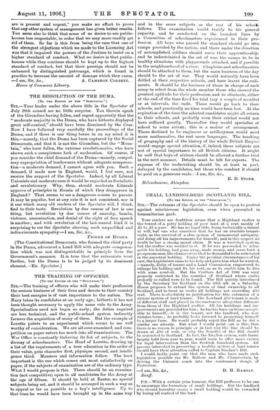THE TRAINING OF OFFICERS.
[TO THE EDITOR OF THE " SPECTATOR." j SIR,—The training of officers who will make their profession the serious business of their lives and devote to their country their best energies is of vast importance to the nation. The Navy takes its candidates at an early age; hitherto it has not been thought necessary to apply the same rule to the Army. Specialisation need not begin so early ; the duties required are less technical, and the public-school system indirectly favours the acquisition of many of them. But the example of Loretto points to an experiment which seems to me well worthy of consideration. We are all over-examined, and com- petition on paper enters too much into all examinations. The War Office is constantly tinkering its list of subjects, to the dismay of schoolmasters. The Head of Loretto, drawing up a list of the requirements of a true education in the order of their value, puts character first, physique second, and intelli- gence third. Manners and information follow. The least important is the one which comes out most satisfactorily on paper, if the subjects of examination are of the ordinary type. What I would propose is this. There should be an examina- tion (not competitive) open to all candidates for the Army at the age of fifteen. It should lze held at Easter, no special subjects being set, and it should be arranged in such a way as to appeal as far as possible to a boy's intelligence. Up to that time he would have been brought up in the same way and in the same subjects as the rest of his schocii- fellows. The examination would testify to his general capacity, and be conducted on the broadest lines by a Committee of schoolmasters experienced in their pro- fession. All boys who passed the standard should go into camps provided by the nation, and there under the direction of accomplished soldiers should serve their apprenticeship, and be indoctrinated in the art of war, the camps to be in healthy situations with playgrounds attached, and if possible in the neighbourhood of a river. Chaplains and schoolmasters should be attached to them, but the main business of the day should be the art of war. They would naturally have been drilled at their respective schools, and have learnt the rudi- ments. It should be the business of those in charge of each camp to select from the whole number those who showed the greatest aptitude for their profession, and to eliminate, either at the end of the time fixed for trial (say a couple of months) or at intervals, the unfit. These would go back to their schools, and practically no time would have been lost. At the expiration of the time the selected candidates might all return to their schools, and probably even their cricket would not have suffered greatly. Thereafter they would specialise at school to some extent; this is a matter of arrangement. Those destined to be engineers or artillerymen would need more mathematics, the rest more languages. The teaching of geography and of the history of the whole British Empire would engage special attention, if, indeed, these subjects are not of special importance to all British citizens. It might be well that boys of sixteen should be allowed a further trial in the next summer. Details must be left for experts. The expense of the undertaking should be, at least in part, defrayed by the candidates, but those who conduct it should be paid on a generous scale.—I am, Sir, &c.,


































 Previous page
Previous page